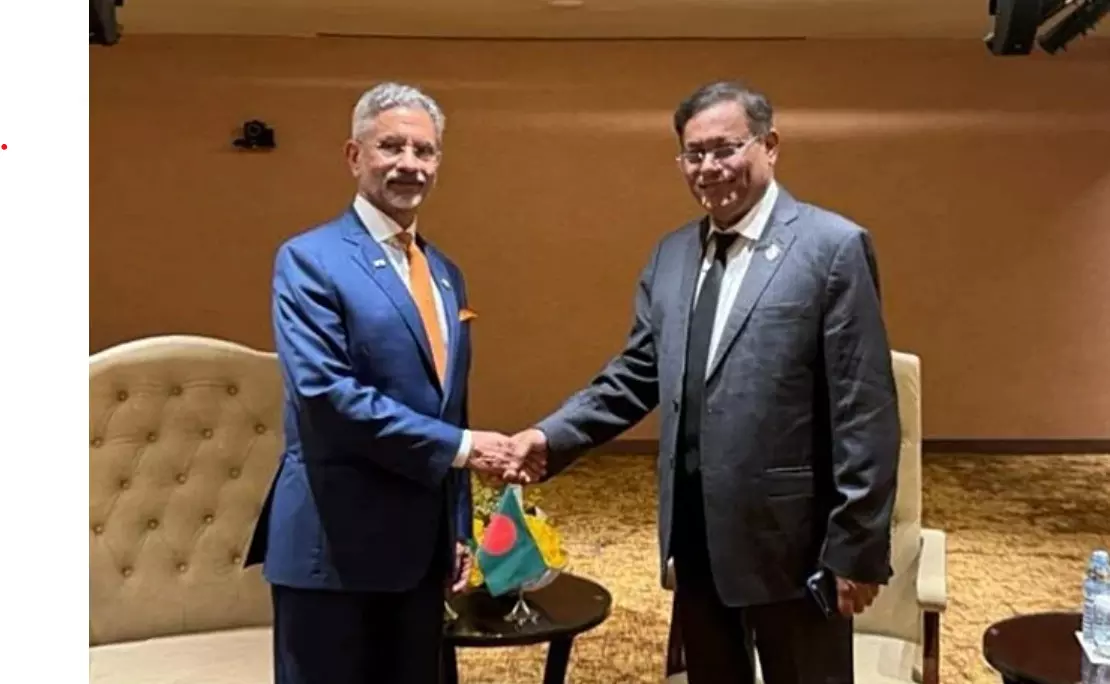Quest for resilience
Disruptions in Indo-Bangladesh relations, fuelled ostensibly by Pakistani and Chinese interferences, demand urgent attention on part of the newly elected Hasina government to maintain robust ties

The maiden visit to India by the new Foreign Minister of Bangladesh, Hasan Mahmud, couldn’t have been better timed. He met his Indian counterpart, S Jaishankar, and the National Security Advisor, AK Doval, and held extensive discussions for improved bilateral cooperation between the countries. He also addressed the media, and importantly, disclosed that the anti-India sentiment, which saw a spike soon after the recently concluded elections that returned Sheikh Hasina to power for her fourth successive term, is now diminishing. The visiting Foreign Minister also supported the recent Indian move to fence the Indo-Myanmar borders to prevent infiltration, impinging on Indian security interests.
Bangladesh well understands the security concerns emanating from Myanmar, principally due to the Rohingya crisis that Dhaka has been facing for nearly seven years. There are well over a million Rohingyas camping in Bangladesh with no signs of return, and disturbingly, a bulk of them have become security liabilities by indulging in religious indoctrination, organised crimes, drug syndicates, and many more undesirable activities, which pose security challenges to India as well due to its geographical proximity.
It may be pertinent to mention that due to a well-choreographed anti-India propaganda launched by a frustrated opposition, the Bangladesh Nationalist Party (BNP), and its all-time ally, the Jamaat-e-Islami (JeI), there was a noticeable increase in adverse publicity in the recent past. Though no hard evidence is yet available at hand, it's objectively safe to assume that Pakistan’s ill-famed Inter-Services Intelligence (ISI) is behind scripting a blueprint reaching Tarique Rahman in London, who is dispatching these plans for execution in Bangladesh. Their frustration was further heightened as their malicious program of sabotaging elections, whipping up communal conflagration, and causing a divide between India and Bangladesh crashed largely due to the determination of the people and, of course, to the exceptionally robust alertness displayed by the Bangladesh intelligence and security agencies.
Now the question is how India and Bangladesh address the issue of a rise in perceived anti-India tirade, even if the Bangladesh Foreign Minister has said that it’s on its way out and has considerably come down. India and Bangladesh jointly need to chalk out an operational plan to beef up their counterintelligence mechanism to thwart ISI designs worked out surreptitiously in Dhaka and London, where Tarique Rahman is operating. Simultaneously, the Jamaat and the like-minded elements in Bangladesh must be identified with a renewed initiative, and stern preventive action taken. This will then be seen as a deterrent. It will also definitely discourage the BNP and JeI rank and file from resorting to any anti-India activity, including making an appeal for boycotting Indian goods. The wind must be taken out of their sails, and this looks like a doable option.
These apart, it’s the social media policing that calls for priority attention. Social media is being abused and misused by hundreds and thousands of fake accounts, working overtime to spread anti-India propaganda to wean away Bangladesh from maintaining harmonious relations with India. Such hostile quarters need to be neutralised with the use of state-of-the-art technology by embarking on a joint Indo-BD operational project to foil enemy designs that seek to harm our interests.
While dealing with this menace, Bangladesh shouldn’t ignore the China factor. It’s common knowledge that China, though not overtly, is peeved over the growing bonhomie in Indo-Bangladesh relations. The recent victory of Hasina testifies to the reality that India and Bangladesh are closer than before against the backdrop of recent events. China, being a close friend of Pakistan, will likely do its utmost to impair these ties. But with the vigilance and maturity of both countries, this could be avoided. There are pro-China elements in Bangladesh who are proactive. They may not directly engage in anti-India propaganda, but they will not oppose it if carried out by others. This deserves undivided attention. At this critical juncture, when geopolitical dynamics are rapidly changing, India and Bangladesh's ties occupy a position of priority. No amount of anti-India sentiment should be allowed to disrupt this warmth, as it would be too costly for both nations. Significantly, both countries have shed blood for the creation of Bangladesh, with Pakistan being responsible. The same country is attempting to disrupt peace once more. Such attempts must be pulverised to smithereens. Come what may.
The writer is a retired IPS officer, Adviser NatStrat, and a former National Security Advisor in Mauritius. Views expressed are personal




